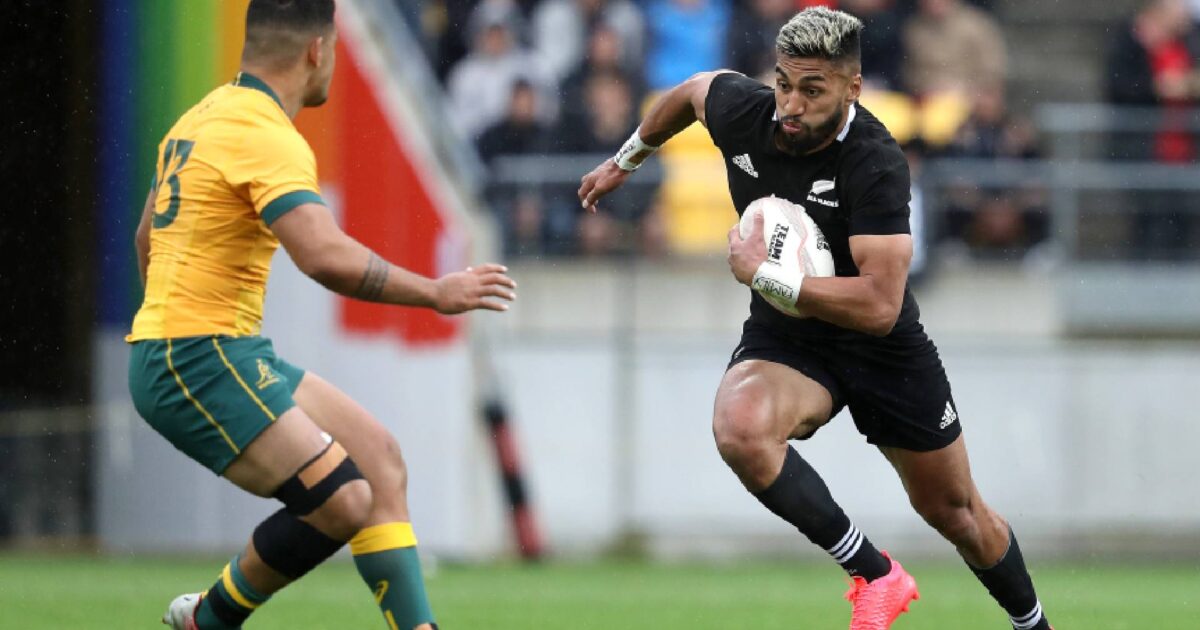All Blacks coach Ian Foster refuses to blame 'sloppy' Rieko Ioane for Wallabies draw

All Blacks coach Ian Foster is bitterly disappointed with the drawn opening Bledisloe Cup test but he refused to blame the result on Rieko Ioane dropping the ball over the line or the decision not to take a dropped kick in the dramatic final stages.
Dave Rennie’s Wallabies came within a coat of paint of stealing the first test of the year as Reece Hodge hit the woodwork from 53 metes out. The visitors tested the All Blacks throughout, controlling much of the ball and territory, while forcing Foster’s men to make 100 more tackles.
The All Blacks took an 8-3 lead into halftime but it should have been at least five more after Ioane dropped the ball over the line while attempting to place it with one hand.
Foster, in his first test match in charge, was philosophical about the blunder.
“It would have been useful – he’s feeling really frustrated, that’s one of those little lessons players have to go through,” Foster of the Blues centre who was promoted on form ahead of Anton Lienert-Brown. “He had a reasonably strong game apart from that. When you get sloppy in those moments it can come back and bite you.
“He’s okay. Part of international rugby is you make an error and you move on. He’s a confident young man and he’s got to learn from that one thing but he can also focus on a whole lot of good things he did too.
“We had a chance to win the game in the last 10 minutes and weren’t good enough. You don’t dwell on errors in test matches. There were errors before and after that. No doubt it would have been nice, but it’s not the reason we drew the game.
“At the end of the day we ended up with a draw which is bitterly disappointing for an All Blacks side but it’s a start and we’ve got a pretty good marker of where we’re at right now.”
At the end of a dramatic nine minutes of added time, after Jordie Barrett levelled the match 16-16 with a 79th minute penalty, Foster’s men could not land the decisive blow despite bagging away at the Wallabies line.
Foster said Richie Mo’unga had set up for the drop goal but the decision was made to chase the match-winning try with the backs, rather than keep picking and going with the big men. A wayward pass, in difficult conditions, forced Barrett to dive forward. The ball was then turned over and James O’Connor ended the engrossing final stages by kicking into touch.
https://www.instagram.com/p/CGMH7VYgZv2/?utm_source=ig_web_copy_link
“We had a number of opinions in the box but we were well set up – Richie was hovering around in that position but Jordie called the ball and it was actually a solid decision because George Bridge was pretty well unmarked,” Foster said.
“It was skill execution – we couldn’t get the ball out to where it needed to be. That hurts, but it’s another message to us all that test rugby is back and if you’re not good enough in those big moments you don’t get the result.
“It was an outstanding kick from Reece Hodge. From that moment it went on and on. It felt like 70 minutes for me. I loved the ‘don’t give up’ attitude we played some smart rugby in that window. We got ourselves into a really good opportunity but we weren’t coordinated enough to take it.”
Sam Cane, leading the All Blacks in the first test since assuming the captaincy from Kieran Read, made 25 tackles while stealing breakdown turnovers.
“The short answer is no – it wasn’t communicated,” Cane said of the non-drop kick attempt. “But I 100 per cent back Richie and back Jordie. It just highlights test match footy is about taking opportunities – there may only be a couple.
“We wanted to go out there and win but I’m really proud of the desire and attitude at the end, the willingness to keep playing. There were 15 boys out there with 100 per cent belief we were going to get there.
“As buggered as you are after a test match like that you’re already looking forward to the next one.”
The All Blacks and Wallabies coaches open up on one of the biggest talking points around the drawn Bledisloe Cup test. #BledisloeCup #NZLvAUS https://t.co/rVdmcaz6pt
— RugbyPass (@RugbyPass) October 12, 2020
Foster acknowledged the Wallabies had the All Blacks on the back foot in a number of areas, particularly with the lack of ball and dominant carries.
“From our perspective it didn’t go our way in many ways the Aussies played a lot of rugby against us. We gave them some easy outs with their kicking which meant we had to make a lot of tackles. I’m proud of the discipline of our team we dealt with that really well and it kept us in the game and we created a few opportunities that we weren’t good enough to take.”
With three matches remaining in this year’s Bledisloe Cup contest, the next at Eden Park on Sunday followed by two in Australia, Foster remains confident the All Blacks will significantly improve to retain the coveted trophy.
“It doesn’t put us on the back foot. We’ve drawn the first one and there’s still three to go. I guess that turns it into the best of three which makes it nice and simple. We’ve got to win two.
“It bodes for a great series. Hopefully that gets everyone excited. We can’t wait for Eden Park now. We’ve got a job to do. Eden Park is pretty special to us and we’re going to have to play well.”










































































